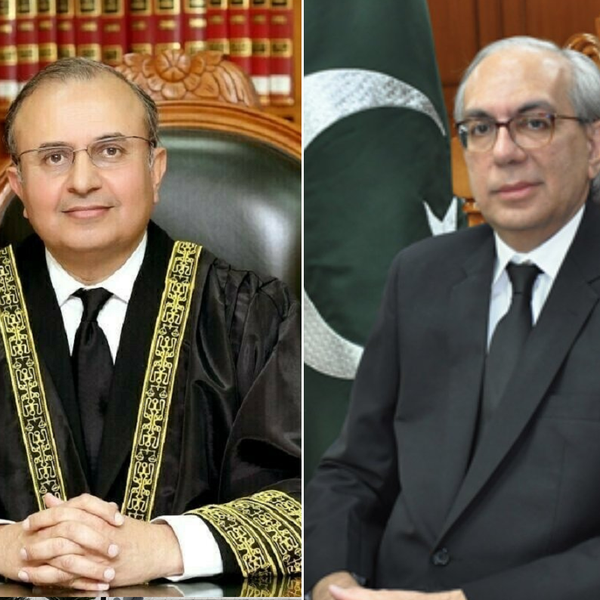Pakistani court overturns espionage conviction of police officer
ASI Zahoor has been acquitted of espionage by Islamabad High Court after a three-year conviction under the Official Secrets Act
Ali Hamza
Correspondent
Ali; a journalist with 3 years of experience, working in Newspaper. Worked in Field, covered Big Legal Constitutional and Political Events in Pakistan since 2022. Graduate of DePaul University, Chicago.

AFP/File
A Pakistani court overturned the conviction of a police officer on Monday who had been sentenced to three years in prison for espionage after allegedly sharing classified information with a foreign diplomat.
The Islamabad High Court acquitted Assistant Sub-Inspector Zahoor Ahmad, a member of the capital city’s police force, ruling that the documents he was accused of leaking did not qualify as secret under Pakistan’s laws.
Justice Mohsin Akhtar Kiyani announced the verdict in open court, accepting the officer’s appeal more than a year after he was found guilty by a special court of the Federal Investigation Agency (FIA) under Pakistan’s Official Secrets Act of 1923.
The case
The original case alleged that ASI Zahoor planned to meet a foreign diplomat near a public transit station in Islamabad in December 2021 and deliver documents deemed harmful to national security. Court records state he was later seen entering and exiting a vehicle with diplomatic license plates.
Zahoor was arrested, and authorities said they recovered two mobile phones, a wallet, and an envelope containing sensitive information. He was convicted on May 18, 2024.
But during the appeal, Zahoor’s lawyer, Advocate Imran Feroze Malik, argued that the documents in question were routine threat alerts issued by Pakistan’s national security agencies — not classified intelligence.
“These alerts are regularly circulated to law enforcement agencies,” Malik said in court, adding that 12 police officials had confirmed this during the original trial. However, their testimonies were never recorded because the prosecution dropped those witnesses.
Justice Kiyani questioned whether such threat alerts, routinely issued and shared, could be considered secret under the law. Malik responded that police receive such alerts frequently, and this was acknowledged in the trial proceedings.
In a key moment during the appeal, the judge asked why the case was registered against Zahoor at all. Malik read from the officer’s statement given during trial proceedings, where Zahoor alleged retaliation by a member of the military.
Zahoor said he had arrested a security officer from Pakistan’s armed forces in 2021 during a raid on a private facility, acting under the instructions of a city magistrate. Afterward, the military officer, identified in court documents as Major Ahmed Haseeb, allegedly conspired to have Zahoor detained by intelligence agencies.
Zahoor claimed he was abducted on Nov. 29, 2021, and held in illegal custody until Dec. 13. He said he was later handed over to unknown individuals, blindfolded, and eventually taken into FIA custody.
“All of this was done at the direction of Major Haseeb, who was embarrassed by the criminal case filed against him,” Zahoor stated in court documents. “To punish me, he fabricated this entire case.”
Justice Kiyani asked whether an official complaint had indeed been filed against the military officer. Malik then submitted a copy of the police report naming him.
What were the charges against Zahoor?
The original charge was based on FIR (first information report) No. 40/2021, registered on Dec. 13, 2021. It accused Zahoor of intending to leak secret documents to a foreign diplomat and charged him under the Official Secrets Act as well as Pakistan’s Penal Code and anti-corruption laws.
The FIA had testified that Zahoor was picked up in a white Toyota Corolla with diplomatic plates and dropped off later at the same location. But Zahoor’s defense said no credible or confidential documents were found, only standard threat warnings from Pakistan’s Interior Ministry and other agencies.
Malik also noted that the diplomat in question — identified as a Russian official named Maxim Panzhaylov — had already left Pakistan before the case was registered.
After the May 2024 conviction, the Islamabad High Court temporarily suspended Zahoor’s sentence on May 30, citing weak evidence and the short length of the jail term. In that ruling, Justice Kiyani wrote: “These threat alert reports... are not to be called secret documents/information... Even otherwise, the sentence is short, and the appeal unlikely to be resolved quickly.” Zahoor was released on bail of PKR 200,000 (about $715).










Comments
See what people are discussing